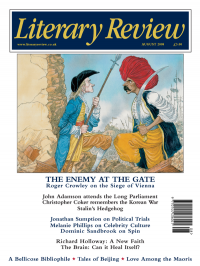Jonathan Mirsky
Reforming Opinions
The Battle for China's Past: Mao & the Cultural Revolution
By Mobo Gao
Pluto Press 280pp £18.99
Mobo Gao is a professor at Adelaide University and director of its Confucius Institute – which I imagine is supported in some way by the People's Republic. Beijing now sponsors such centres to show that China has reclaimed aspects of its traditional past. If this is the case at Adelaide, Beijing will not like Gao's views on post-Mao reform, so he should be commended for expressing them, even though I disagree with many of them.
Gao's main theme in The Battle for China’s Past is that although there is much to condemn about Mao and the Cultural Revolution (1966–76), the Chairman was a great visionary who wanted true social equality for China, while the Cultural Revolution was enthusiastically supported by many Chinese, especially the vast

Sign Up to our newsletter
Receive free articles, highlights from the archive, news, details of prizes, and much more.@Lit_Review
Follow Literary Review on Twitter
Twitter Feed
It wasn’t until 1825 that Pepys’s diary became available for the first time. How it was eventually decrypted and published is a story of subterfuge and duplicity.
Kate Loveman tells the tale.
Kate Loveman - Publishing Pepys
Kate Loveman: Publishing Pepys
literaryreview.co.uk
Arthur Christopher Benson was a pillar of the Edwardian establishment. He was supremely well connected. As his newly published diaries reveal, he was also riotously indiscreet.
Piers Brendon compares Benson’s journals to others from the 20th century.
Piers Brendon - Land of Dopes & Tories
Piers Brendon: Land of Dopes & Tories - The Benson Diaries: Selections from the Diary of Arthur Christopher Benson by Eamon Duffy & Ronald Hyam (edd)
literaryreview.co.uk
Of the siblings Gwen and Augustus John, it is Augustus who has commanded most attention from collectors and connoisseurs.
Was he really the finer artist, asks Tanya Harrod, or is it time Gwen emerged from her brother’s shadow?
Tanya Harrod - Cut from the Same Canvas
Tanya Harrod: Cut from the Same Canvas - Artists, Siblings, Visionaries: The Lives and Loves of Gwen and Augustus John by Judith Mackrell
literaryreview.co.uk